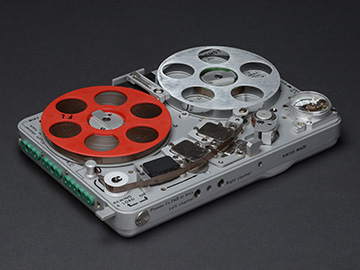
 Over-engineered surveillance gadgetry has always held a special (if somewhat perverse, given my professional interests) fascination for me. As a child, I understood that the best job in the world belonged to Harry Caul (and as an adult, it was a thrill to finally meet his real-life counterpart, countermeasures expert Marty Kaiser, last week).
Over-engineered surveillance gadgetry has always held a special (if somewhat perverse, given my professional interests) fascination for me. As a child, I understood that the best job in the world belonged to Harry Caul (and as an adult, it was a thrill to finally meet his real-life counterpart, countermeasures expert Marty Kaiser, last week).
So perhaps it was inevitable when recently, facing a low-grade but severely geeky midlife crisis, I recaptured my youth with the Maserati of 70's spy gear: the Nagra SNST (see photo at right). For decades, this miniature reel-to-reel audio recorder, specially optimized for eavesdropping, was the standard surveillance device, used by just about every law enforcement and intelligence agency that could afford the money-is-no-object price tag. Slightly larger than two iPods, the SNST runs virtually silently for over six hours on two AA batteries, and can record about two hours of voice-grade stereo audio on a 2.75 inch reel of 1/8 inch wide tape. Now largely made obsolete by soulless digital models, the Nagras are built more like Swiss watches than tape recorders. And trust me, now that I own one, I feel twenty years younger.
I bought mine on the surplus market and ended up with a unit from the Missouri State Highway Patrol, where it had been used in drug and other investigations until at least 1996. Why do I know so much about its history?
Because my new surveillance recorder came with a tape.
I had assumed the tape would be blank or erased, but before recording over it a few days ago, I decided to give it a listen just to be sure. Much to my surprise, it wasn't blank at all, but contained a message from the past: "February 8, 1996, I'm Trooper Blunt, Missouri State Highway Patrol..."
The tape, it turns out, was an old evidence recording of a confidential informant being sent out to try to purchase some methamphetamine. But the informant's identity isn't so "confidential" after all: his name, and the name of the guy he was to buy the drugs from, was given right there at the beginning of the tape. The tape they'd eventually sell me a dozen years later.
I made an MP3 of the recording; it's about 42 minutes long and, I must admit, as crime drama goes it's a letdown. It consists almost entirely of the sound of the informant driving to and from the buy location, with no actual transaction captured on tape. No intricate criminal negotiations or high-speed car chases here, I'm afraid. So, although the recording is fairly long, all the actual talking is in the first few minutes, where the officer gives last-minute instructions to the informant. But just in case someone involved still harbors a grudge after 12 years, I've muted out the names of the informant and the suspect from the audio stream. You can listen to the audio here [.mp3 format].
Unfortunately, this isn't the first time that confidential police data has leaked out in this and other ways, and it no doubt won't be the last. Law enforcement agencies routinely do a bad job redacting names and other sensitive information from electronic documents; in May, I discovered deleted figures hidden in the PDF of a Justice Department report on wiretapping. And a few years ago, when my lab was acquiring surplus telephone interception devices for our work on wiretapping countermeasures, some of the equipment we purchased (on eBay) contained old intercept recordings and logs or was configured with suspects' telephone numbers.
None of this should be terribly surprising. It's becoming harder and harder to destroy data, even when it's as carefully controlled as confidential legal evidence. Aside from copies and backups made in the normal course of business, there's the problem of obsolete media in obsolete equipment; there may be no telling what information is on that old PC being sent to the dump, where it might end up, or who might eventually read it. More secure storage practices -- particularly transparent encryption -- can help here, but they won't make the problem go away entirely.
Once sensitive or personal data is captured, it stays around forever, and the longer it does, the more likely it is that it will end up somewhere unexpected. This is one reason why everyone should be concerned about large-scale surveillance by law enforcement and other government agencies; it's simply unrealistic to expect that the personal information collected can remain confidential for very long.
And whatever you do, should you find yourself becoming an informant for the Missouri Highway Patrol, you might want to consider using an alias.
MP3 audio here.
Photo: My new Nagra SNST; hi-res version available on Flickr.